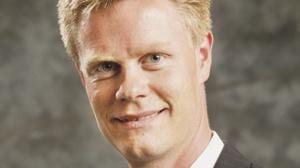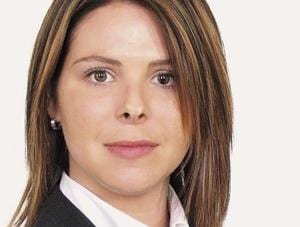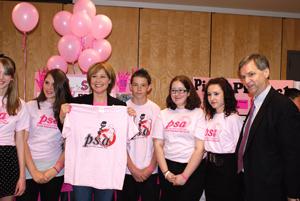
Social conservative Ken Boessenkool is a former lobbyist for Enbridge Inc and Taser International and was a senior advisor to Prime Minister Stephen Harper. He became BC Premier Christy Clark's chief of staff in February. Credit: Jeremy Hainsworth

Sara MacIntyre was Harper's press secretary and is now Clark's director of communications. Credit: Jeremy Hainsworth
A week, as the saying goes, is a long time in politics. But the not-so-secret word is that Christy Clark and the BC Liberals will go down in flames a year from now.
Political observers such as Bill Tieleman even suggest that it could happen in less than a year and float the idea of an early election call.
Tieleman, who advised former BC NDP premier Glen Clark, is among those speculating that the Liberals could head to the polls minus Clark. She’s had more than a year-long job interview and failed it, he says bluntly.
“There’s a feeling that the Liberals have failed, basically that Campbell failed — the HST was emblematic of his failure — and that Christy Clark is not any better,” he says.
While the economy, healthcare and the environment are probably key election issues, the question of leadership overrides them, Tieleman contends. “That’s why I say there is a possibility of a change in leadership and an early election this year.”
There’s no question that Clark and the Liberals have had “one bad issue after another tumbling on,” agrees political analyst and former Social Credit minister Rafe Mair, but he thinks it highly unlikely Clark will bow out at this juncture. “To have a new leader requires time, and time they do not have,” he points out.
“It’s bad enough as it is, and if they go into another leadership convention, they’re going to have four, five members of caucus fighting one another. The wise money says they’re better off to try to ride with what they have rather than go through that potential bloodbath,” he says.
There is no magic-bullet solution for the ruling party, Tieleman acknowledges. He says the fallback alternative to Clark is Kevin Falcon, but he polled even more poorly than Clark previously did, while George Abbott came in third in the last leadership convention.
Neither does Tieleman envisage former finance minister Carole Taylor or current Surrey Mayor Dianne Watts wading into the fray.
“Somebody who wants to be a future leader or premier doesn’t want to be associated with what appears to be a gigantic defeat, so I can’t see somebody coming in from the outside and saying , ‘Oh, I’ll make my name now,’ presuming that Clark will be convinced to leave,” he says.
Mair recalls that Clark had only one member of caucus support her leadership run. “Which means every other member has a death wish for her,” he maintains. Those who want her gone fear a Liberal wipeout akin to what happened to the BC NDP in 2001, when the party won only two seats.
“To be absolutely truthful, I don’t think they have a chance,” Mair says of the Liberals.
***
Recent polls paint a bleak picture of what lies ahead for the BC Liberals if their current trajectory holds.
An online Angus Reid poll of 802 BC residents shows the NDP had corralled 50 percent of decided voters — a climb of seven percent since April. The Liberals were at 23 percent.
It’s an outcome Clark brusquely dismisses.
“I think the Angus Reid poll contributes, first of all, to the growing cynicism about polls in general,” she told the CBC. “I think polls are getting less and less accurate, and I also think that these internet polls that some of the companies are doing now are the least accurate of all.”
Her rebuke flies in the face of news that the Liberals had themselves hired Angus Reid to get a feel for the public’s appetite for its jobs plan.
But if she didn’t care for the Angus Reid findings, the results of another survey revealed a similar scenario. A Forum Research poll released May 3 showed support for the NDP at 48 percent. Like Angus Reid, Forum Research also had the Liberals at a static 23 percent. The Conservatives, under John Cummins, dropped five percent and are now at 18 percent; Angus Reid had them at 19 percent.
The conclusion? If this trend of voting intentions holds, the NDP will occupy 70 of 85 legislature seats, leaving the Liberals with a paltry 13.
And those dreaming of a Conservative presence in government? Polls suggest they’ll be seatless, with independents Vicki Huntington and Arthur Hadland snagging the two remaining places in the House.
The Forum Research poll also looked at support for the party leaders. The NDP’s Adrian Dix rides high at 39 percent favourability; Clark is at 25 percent, while Cummins dropped to 21 percent, from 28 percent in April.
Like Angus Reid, Forum Research gauged both Liberal and Conservative appetite for an amalgamation of the two parties. Six in 10 Liberal supporters want to merge with the Conservatives to head off an NDP victory. Conservative supporters are less keen.
Noting that the Liberal brand, in marketing terms, is not on the rise, Marci McDonald, the author of Armageddon Factor: The Rise of Christian Nationalism in Canada, believes such an alliance could be successful in BC because the electorate is very divided.
“I think the issues are such these days that they lend themselves less to compromise and more to people digging in on entrenched positions. I think that with such polarization, economic conservatives automatically have to find themselves in alliance with social conservatives.”
But a recent National Post article suggests Clark’s and Cummins’ public postures make it clear that such a merger is all but dead in the water, at least for now.
As for the floated idea of a name overhaul for the Liberals, fewer than a quarter of the party’s faithful want a brand name change, Forum Research finds. Nonetheless, it’s a project Clark appears to be pressing ahead with.
Tieleman thinks such a move less than a year before an election is tantamount to political suicide. Why toss a recognized label that won the party “three consecutive elections and almost a fourth between 1996 and 2009,” he writes in The Tyee.
“You don’t throw out the name Tylenol unless you’re absolutely stuck,” he tells Xtra.
Still, Tieleman stops short of declaring the NDP a shoo-in to form the next government. “I’ve seen too many times in BC political history when we thought the NDP was going to win when they didn’t. I think they have to work very hard,” he says.
He suggests Cummins’ Conservatives could pose a threat to the NDP’s current ascendancy, despite the former’s flagging fortunes.
“I said in a column after he became the BC Conservative leader that the NDP should be concerned about Conservatives poaching votes from their traditional supporters, because that’s what happened with Reform in the 1990s. I would expect that a lot of rural and semi-rural ridings, where you have a fair-size blue-collar population, they might say, ‘I like what John Cummins is saying.’”
But Tieleman concedes the Conservatives are more of a threat to the Liberals, potentially replacing them as the Official Opposition to the NDP.
“We saw in 1991, the SoCreds just went from first to third, and the BC Liberals who had no seats and hadn’t had an elected member in many years under Gordon Wilson became the Opposition. I think that’s probably the BC Conservative strategy at this point, and I think that is entirely possible.”
If the Clark government goes down as badly as now seems likely, Cummins may squeeze in with a small number of MLAs, enough to form the Opposition, Mair says.
If anything, he says, Cummins may come up wanting on social issues.
“He made some mistakes just after he became leader, then he sort of reversed himself, which was the right thing to do,” Tieleman says.
Cummins caused a stir when he told CFAX radio in May 2011 that being gay is a choice and that it wasn’t necessary to add sexual orientation as a protected category in the Human Rights Code because people are fully protected under it already.
He later released a statement saying his statement was misinterpreted. “All British Columbians, regardless of race, religion, gender or sexual orientation should have the same equal opportunities and protections in our society. We all should be treated equally before the law, and no group in society warrants preferential treatment,” he said.
While Mair doesn’t think support for Cummins hinges on his position on gays, he says it’s one of those factors that feeds into the internal machine of the voter, which says, “This guy is just a little bit scary.”
***
Polls, not to mention political opinion, can be off-base, as the recently contested Alberta provincial election proved.
On the weekend before the April 23 vote, the Wildrose Party, under Fraser Institute alumnus Danielle Smith, sat 10 percentage points ahead of Alison Redford’s Progress Conservatives, having led the race from the start.
A week later, the PCs pulled off a come-from-behind majority victory — by almost 10 percentage points.
One Wildroser told the Toronto Star’s Tim Harper that the Conservatives, a 41-year-old dynasty, had “a lot invested in hanging on.”
But overwhelmingly, the Wildrose defeat has been blamed on outspoken candidates Ron Leech and Allan Hunsperger. While Leech talked up his Caucasian credibility (saying that, unlike Sikh or Muslim candidates, as a white man he could “speak to all the community”), Hunsperger warned that gays and lesbians will burn in “a lake of fire” if they don’t change their sexual orientation.
When Smith defended rather than censured her candidates’ free speech, many Alberta voters pulled the emergency brake.
“What really undid her were these bozo eruptions because it tore the veil off this sort of mainstream sheen that the Wildrose had acquired,” McDonald says. “What surprised me was everyone thought this was a huge shock.”
Wildrose is infused with Canadian Alliance social conservatism, McDonald points out. “People kept saying her big mistake was she did not disown these comments. Well, anyone who knows the history and formation of the party [knows] she couldn’t disown a whole segment of her party.”
Defeated Wildrose candidate Link Byfield, who helped found the party, is the son of Ted Byfield, whom McDonald calls the godfather of social conservatism.
Stephen Harper’s mentor Tom Flanagan was also Smith’s strategist and manager. Everyone from Ezra Levant, one of Flanagan’s former students, to people close to the prime minister were championing Wildrose, McDonald says.
“I think that threw the pollsters off, because suddenly people in Alberta woke up to the fact that this was not a refreshing new face of conservatism.”
Back in BC, Clark, too, has tapped former federal Conservative strategists as advisors — such as social conservative and former Enbridge lobbyist Ken Boessenkool, who became her chief of staff in February.
Clark’s team also includes Dimitri Pantazopoulos, a pollster linked to Toronto’s Mayor Rob Ford and the federal Conservatives who is now listed as assistant deputy minister of trade and federal-provincial relations in the BC government’s online directory.
In March, Sara MacIntyre, Harper’s former press secretary, became Clark’s communications director. And in April, The Vancouver Sun’s Jonathan Fowlie reported that Clark’s office confirmed former Conservative MPs Chuck Strahl, Stockwell Day and John Reynolds had been trying to mend the centre-right rift after Clark’s Liberals lost two ridings to the NDP in by-elections where votes for the BC Conservatives were a factor in their defeat.
“What she’s doing is obviously tapping a centre-right sentiment, with more emphasis on the right recently, to bring the right into the fold,” McDonald says.
“I would think her key strategist is Boessenkool,” McDonald suggests. “He’s a fine strategic mind, and he has seen the likelihood of an alliance and of moving the party that way.”
Strong advisors can make a good campaign out of a mediocre one, Mair says, but he still thinks Clark and the Liberals are fighting a rearguard action.
Though Clark is not suffering from the obvious “bozo eruptions” that derailed Wildrose, she may be suffering from bad advice to lean right at every opportunity — advice given by people from the same conservative family that guided Wildrose to defeat.
Ultimately, whether she goes down in flames or not, the polls make one thing clear right now: Clark is not well liked on either end of the political spectrum. And that is a problem for any premier, especially one seeking reelection at the helm of a sinking ship.


 Why you can trust Xtra
Why you can trust Xtra


